Happy Monday, friends!
This is probably one of the best posts I have ever written (in my opinion). It is a series of life musings on investing, success, and how to live a happy life.
But first, how was your week? Did you survive the tragic car accident a week ago on Monday?
I've talked to a lot of people, and surprisingly, a lot of them have failed.
A huge problem that many people in crypto have is that they apply a Martingale strategy (without even knowing it) and think that this will eventually make them win.
You buy on the dip, then the stock price drops further, so you double down, the stock price drops again, you put in more money, then the stock price drops again, you put in your last money, and to your surprise, the stock price drops again, and even if you have low leverage (3-5x), you can get completely beat.
A week ago on Monday, $ETH dropped 17% in 4 minutes.
Now do the math if you have 5x leverage on this position.

If you put in x hours, you will earn y amount and produce z amount of product/service.
Well, at least that's how most people think. Their thinking is linear.
But is this the right way to think about it?
If you use leverage and time, you get compound interest. The results you generate are added to the existing layers.
If you take 10 + 10 + 10 + 10 + 10 + 10 + 10 + 10 + 10, you will easily see that it equals 90.
But if I asked you to calculate a 10% interest rate on an investment over 40 years, most people would think that you just add 10% + 10%… forty times to get 400%.
But the answer is not 400%.
The answer is: 4,525%.
This means that a $100,000 investment would turn into $4,525,000 in 40 years.
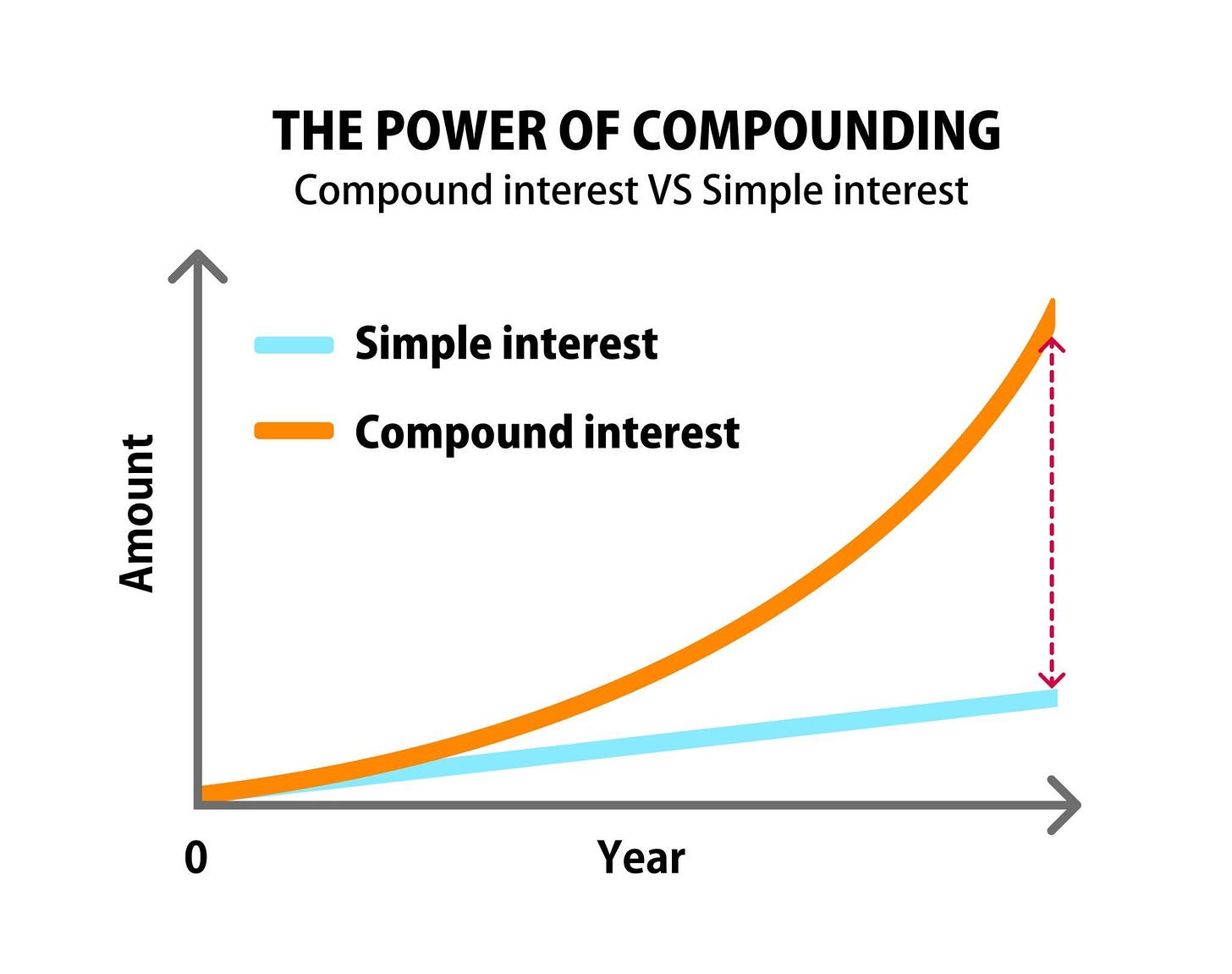
The above illustrates the principle of compound interest.
I won’t go into detail on this, I just wanted to show an example of exponential thinking.
Use leverage to make progress in your life
Most people have an overly realistic view of life. They don't realize that leverage allows you to move from a linear path to an exponential path.
Leverage comes in many forms, such as capital, technology, brand, network effects, and people management.
Use them to go beyond linearity. You should take risks in your life and choose a career where you can take advantage of leverage and compounding. The typical 9-5 job with no equity compensation has very limited upside.
Instead, try starting your own business, join those who have already started a business, where you can get a flexible role with your own career development, equity compensation, and the possibility to apply the skills you learn there in other fields or your own startup in the future.
I can’t think of a better way to maximize your impact in this modern world than by creating your own personal brand. I’ve done this myself, and when I think back on my journey, what I’ve created is absolutely amazing.
People read my thoughts because I write them. You want to learn about investing, cryptocurrencies, and the latest income opportunities from people who have lived it, not from your PhD college professor.
Apply leverage in everything you do and start thinking about how much more your knowledge, skills, and mindset will increase in a few years due to exponential growth. Think bigger. Those who believe they can change the world will change the world.
On taking risks and making asymmetric bets
I would say that once you have certain basic needs met, you should be willing to take big risks, and I like the FIRE mindset (monthly expenses x 12 months x 25).
This number should be enough to satisfy the 4% rule, which means you can withdraw 4% from your stock market portfolio and never drop it to zero (assuming a 10% annual growth rate).
However, if you are young and don’t have a lot of obligations and monthly expenses, I think it makes sense to take a risk without much savings.
Ask yourself, what is the worst that can happen? Usually the worst that can happen is that you end up right back where you were. On the other hand, if you take risks, you can increase your current wealth 10-fold (this applies not only to money, but also to skills and opportunities).
Aim for asymmetric betting (see example in my tweet below):
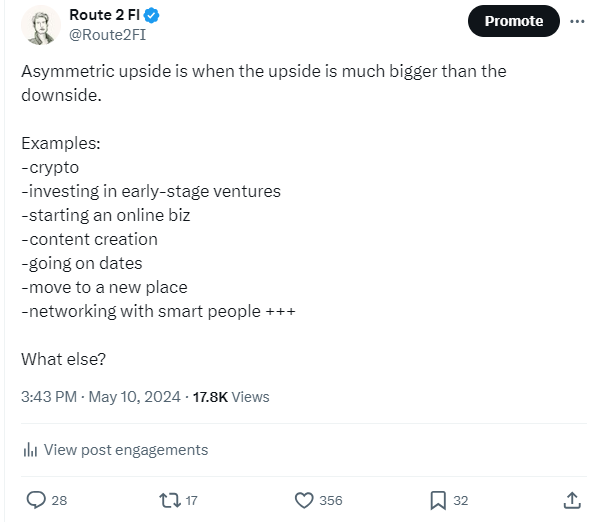
An asymmetric upside bet is one where the upside nets you 10 to 100 times your money if you win, but if you lose you only lose very little.
Stay away from risks that offer small rewards if you’re right, but potentially large risks if you’re wrong.
As shown below.
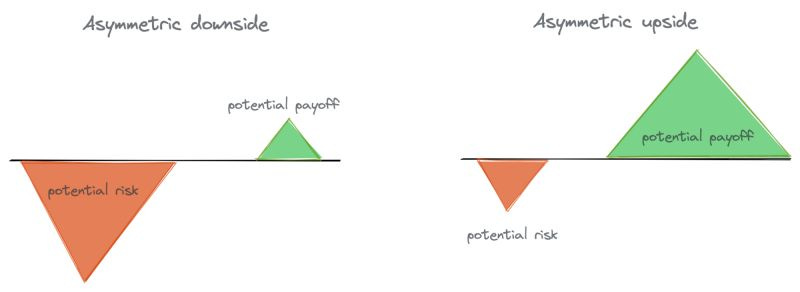
Prioritize long-term gains (years/decades later) over short-term gains (a comfortable state of monthly paychecks). Survival is important no matter what.
The problem is that many people are quite happy with their jobs, and as their salaries increase, the risk of trying for a bigger reward becomes less and less attractive.
The cost of replacement is getting bigger (or at least it feels that way). However, the fact is that almost everyone (at least in the Western world) can return to their current job or a similar replacement job at the same salary if they fail at trying a new opportunity.
Universal basic income to stimulate entrepreneurship
Free yourself from hedonism and you can focus on your true passion or mission in life. I read a book by Rutger Bregman called Utopia for Realists, in which he says that UBI (Universal Basic Income) will stimulate entrepreneurship and social creativity.
The reason is actually very simple. Let's assume that everyone receives $3,000 in their bank account every month. Let's also assume that this amount of money is enough to live on so that you don't need to do any extra work to maintain your income.
Universal basic income will provide entrepreneurs with a sense of security. In some areas where universal basic income is implemented, the entrepreneurship rate has increased by 301 %. Data shows that for every 1 percentage point increase in a state's entrepreneurship rate, the poverty rate will drop by 2%.
One argument against UBI is that many people will end up being lazy, depressed, and doing nothing. While this may be true, I believe most people will try to follow some passion.
If by becoming an expert in video games, TV series, or creating startups, I believe we will end up with a net positive effect of UBI and more innovation than we see today.
What do you really want in your life?
You may have heard this saying:
“ Give me six hours to chop down a tree, and I’ll spend the first four sharpening the axe.”
I mention this quote because I think it’s important when you’re faced with big decisions and choosing what kind of work to focus on.
If you’re wondering what kind of work you should focus on in your life, or what you should prioritize for the next year, it’s better to take a few days in complete silence to really develop a plan with actionable steps rather than just start going with the flow right away.
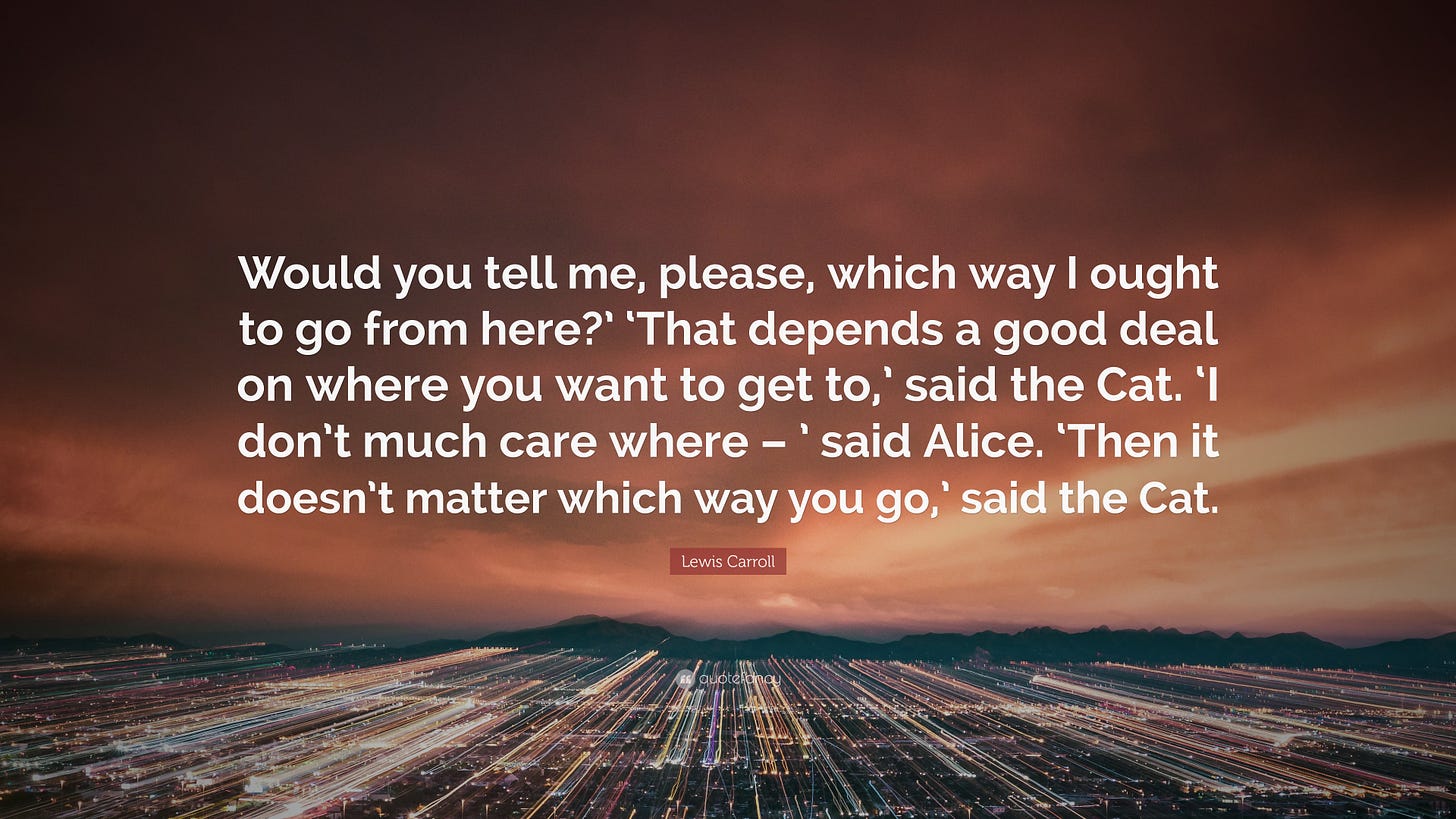
As the quote above from Alice in Wonderland goes, if you don’t know where you want to go, it doesn’t matter which direction you go.
The point is to spend more time thinking about what you really want to do. Most people can create wonderful things if they just believe in themselves.
I think there is a huge trend in today's social media society to watch short clips and TikTok videos about how to improve your life, but few people take action. They watch the videos, but ultimately do nothing. You may feel productive, but it's actually no better than watching a TV show. It's just a short-term dopamine rush.
Ask yourself if you are doing anything for your long term growth or if all activities you do are based on short term pleasure (food, sex, exercise, videos/music that make you feel something, meeting girls, playing games, drugs, alcohol).
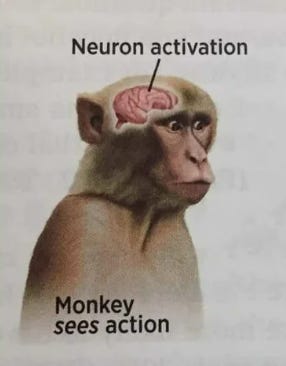
While there's nothing wrong with doing these things, don't make your life revolve around them. After all, you're not a monkey. You can delay gratification (think of the marshmallow experiment), but a monkey can't.
Examples of long-term activities (long-term happiness):
- Learn a language
- Starting a business/small company
- Complete a marathon
- Earn a college degree
- Live in another country
- Write a book
- Learn skills that could change your career
- invest
- lose weight
- Build your personal brand
- +++
Why being the best in your field brings huge rewards
Another factor is that finding your ultimate purpose is a lot of fun. When I was working 50-60 hour weeks at a corporate job, I hated my life every day and at first I thought it was because of the long hours.
But that's not the case. What I hate is not working on something that has no impact on my life. Every hour of work I put into Route2FI today (yes, it's just me) will eventually pay off in some way. Well, not necessarily, but the good and the bad will all be mine.
This keeps me very motivated to do this work well because no one can make this work a success except me. If I don't show up, my motivation stalls.
If you think about it, being in the top 10% in a field isn’t necessarily hard. You just have to put in a lot of time (and work hard). But if you want to be in the top 1-2%, then you have to work smart, too.
This is something I should definitely improve on. I sometimes wonder how much bigger my business would be if I outsourced more work, or gave up writing tweets or newsletter posts altogether.
However, I do enjoy it. And now, this isn’t about squeezing the most money out of a market or partnership opportunity. I’m also doing it because it gives me satisfaction. I’m writing these words now because I’m having fun doing it. Writing is something I’ll always do, and it’s something I don’t want to outsource.
Life is long, so don't be afraid to ask for what you want. Don't settle for what you have. This applies to your career as well as your partner and friends. If you want good luck in life, you need to prepare yourself for good luck to find you. Interestingly, when you work hard, good luck often finds you.
Stop for a few seconds and think about this:
“What do I want in my life?”
You may answer some questions that you didn't answer today or questions that you missed. But let me ask you this question.
How much effort did you put in to get what you wanted? How much time did you invest? Do you want to create a successful TikTok brand but haven’t started yet because you think it’s too saturated?
Most people put off starting, or never actually start something, because they don't set small steps. They only think about the end goal and conclude that they can't achieve it without trying.
Acquire specific knowledge
Naval says you need specific knowledge. Specific knowledge is knowledge that only you have. The easiest way to create this knowledge is to have a personal brand. As I mentioned before. People read my thoughts because I am the one who writes them.
We could send this text to an unknown Twitter account and it wouldn’t get many views. Not because the text isn’t good, but because they don’t have followers. But if you repeat this exercise (post weekly for years), the right tribe will find you.
This is something I'm good at, perseverance. I know I'm not the best writer. I know my writing could be better if I spent more time editing, making better graphics, asking people to give me feedback before posting, etc. But instead of being perfect, I post at 80%-90% completion.
For me, this is the only way to get things done. Over time, I've become very happy with it. I look back on the 100+ articles here with pride. If I were too obsessed with perfection, I'd probably only get 25% of the work done.
Get expertise. Have an unconventional opinion. Some people will love your unique style. Define yourself by your strengths, not your weaknesses. Imagine how much better you would be if you focused only on your strengths.
You can be the top 1% in a certain field. Instead of improving your sales skills from 45th to 50th percentile (this is just a random example, but my point is that to be one of the best you should focus on what you are naturally good at).
Make sure you have enough money to make decisions based on what you really want to do, rather than making those decisions out of a desperate need for money.
Because in my opinion the best thing you can do is that you are intrinsically motivated to do it. Yes, there can be great intrinsic motivation for doing an average job, but if the employer stopped paying the salary, most people would quit.
A good test to know if you are doing something with your heart and soul is to ask yourself: What would I do if I didn’t think about money?
You can watch Alan Watts' video below.
Ten years ago, this sentence gave me great inspiration:
It's hard to do a job you don't care about.
Additionally, working a job you don't enjoy will make it difficult to be fully satisfied with your life. Strive to be the best you can be at whatever job you do. Be brave and take chances in life, especially at the beginning of your career or in your 20s.
Make an effort to hang out with the people who are some of the greatest in the world in their field (in my case, I met these people on Twitter, and I’ve had the pleasure of meeting many of them in real life as well).
Think about it this way, the chances of your friends being as genuinely interested in a particular topic as you are are slim, whereas on Twitter there are thousands of people just like you digging into the same issues.
Find them and make friends with them.
Believe me, it's worth it.
…
I pause for a moment.
Let me know if you liked the post and if I should share more like it.
See you later.






